Parliamentary elections on October 29
What do Dutch political parties want to achieve in higher education and research?

These elections will also determine the future of Dutch higher education and scientific research. In this overview, the Higher Education Press Agency (HOP) compares the election programmes in terms of what they say about the sector.
Please note that parties attempt to show themselves in the best possible light in their election manifestos. It is not uncommon for them to make plans solely to win votes, without specifying how they intend to pay for them.
More money for students
Some parties advocate for increased student financing, while others argue that doing so is unnecessary, citing that some students have wealthy parents or will earn sufficient income later to repay their student debts.
It is worth considering that increasing the basic student grant (a benefit all Dutch students are entitled to) is certainly not the only way to boost students' wallets. This can also be achieved through healthcare allowances, housing benefits, and lower VAT on groceries, to name a few examples.
CDA (Christian Democratic Appeal) would like to establish a scholarship programme for excellent students, so we could place that party on the left side of the table. NSC (New Social Contract) says it wants to maintain the basic grant.
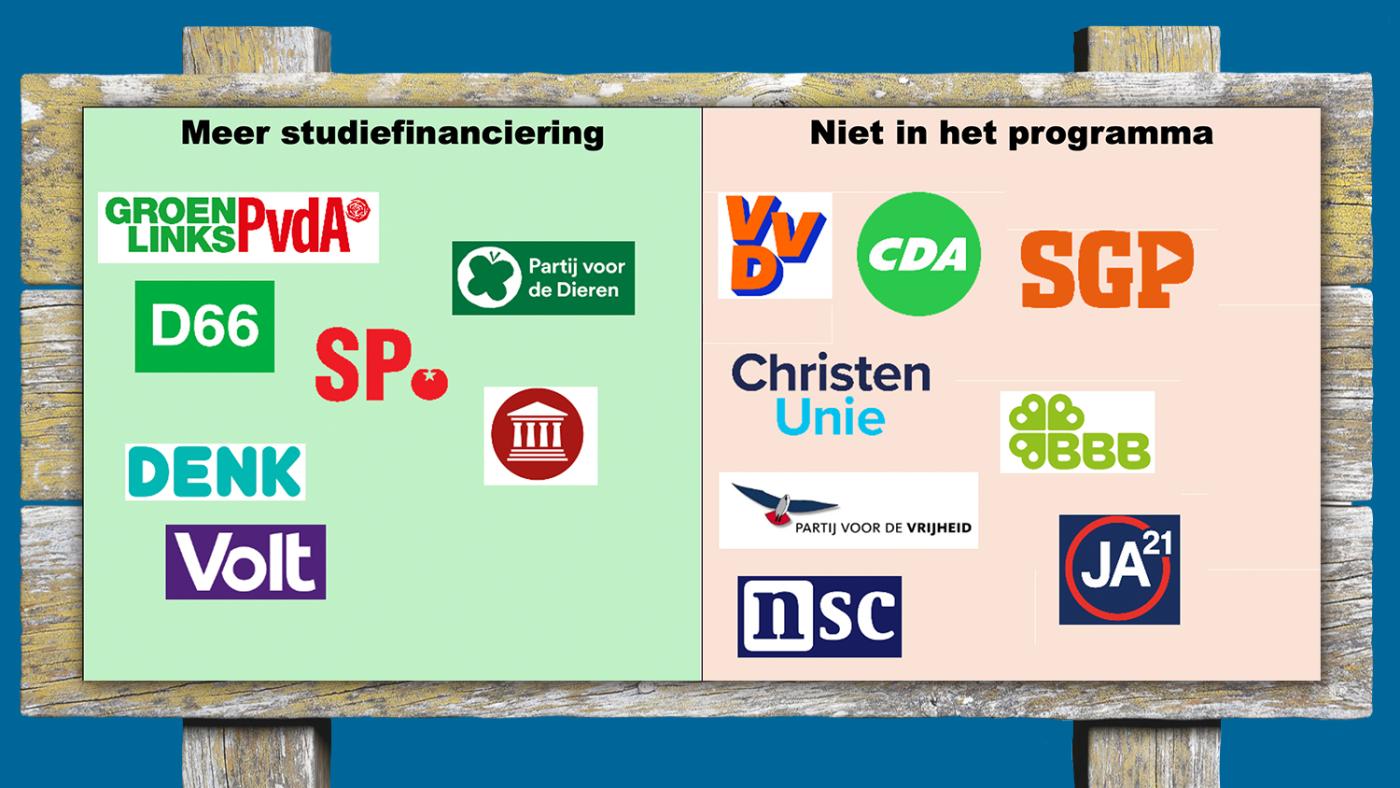
To the left, the political parties in favour of more student financing. To the right, those against it.
How much should students pay in tuition fees?
Another way to make studying cheaper is by reducing tuition fees. One could stop charging 2,600 euros a year and instead start charging half that amount or even nothing at all. Such a reduction could be applied to all degrees or only to those related to sectors facing labour shortages, such as healthcare, technology and education.
Some parties, such as Volt and the Reformed Political Party (SGP), want to make an exception for student administrators, those who serve on the boards of study or student associations, and therefore do not have time to take courses.
The Socialist Party (SP) proposes to abolish tuition fees altogether in the long term. The centre-right party VVD, which has been the largest party in the Netherlands for years, is receiving considerable attention thanks to its idea of a 'short study bonus' for students who graduate on time. The proposal stands out because it is the opposite of the fine for students who take longer than one additional year to graduate, which the current cabinet tried to implement without success. VVD is one of the parties in the current cabinet. BBB (the Farmer-Citizen Movement, another party in the current cabinet) still advocates a penalty for those who take longer to graduate than usual. However, that doesn't mean VVD has completely changed its mind: it still wants to establish a penalty for late graduation, only this time, educational institutions would be the ones penalised instead of students. Universities would pay a fine each time a student fell behind.
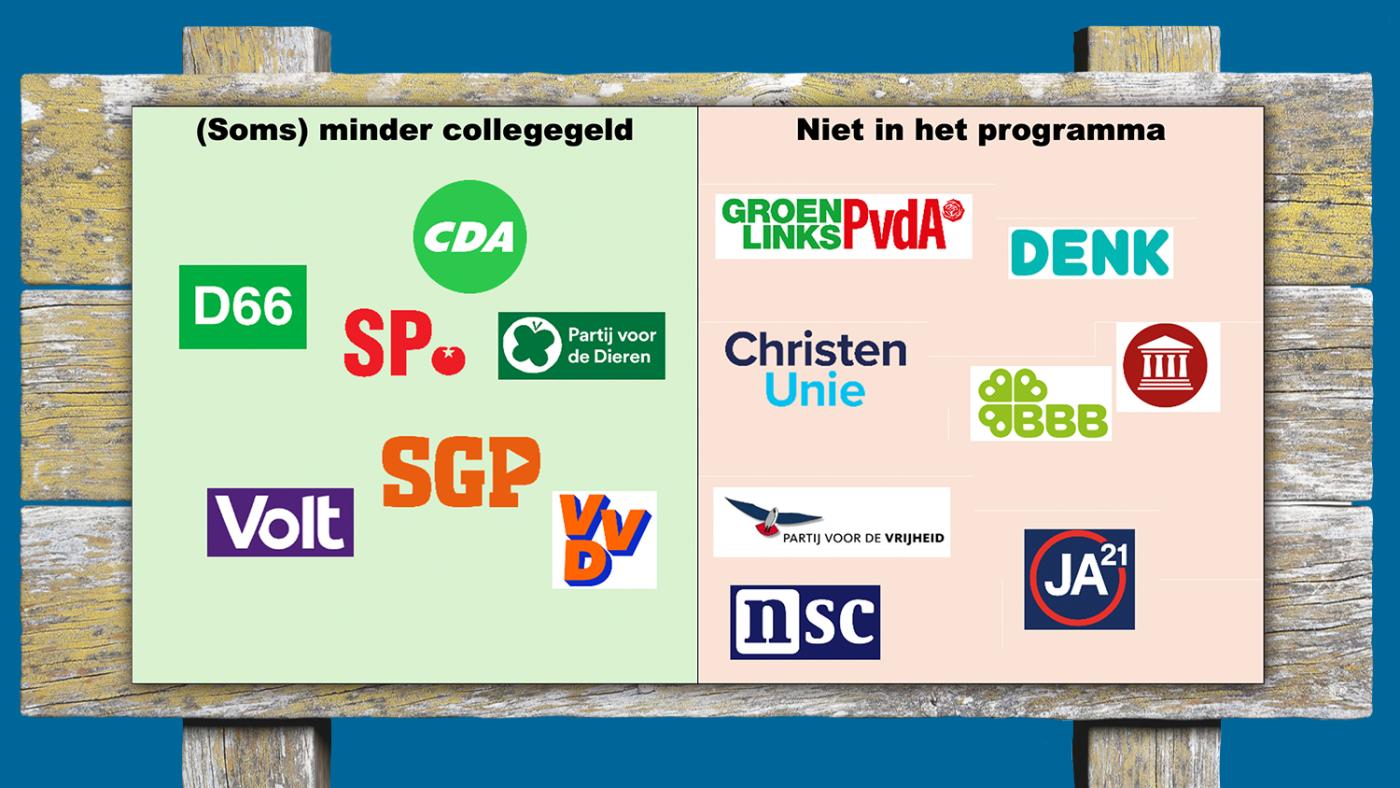
The parties on the left would like tuition fees to decrease for everyone, or for some students. Those on the right do not mention anything about it in their manifestos.
English-taught education
Some parties believe that there are too many international students in the Netherlands, so they advocate for more courses to be taught in Dutch. In their view, this measure would also have the advantage of enhancing Dutch students' proficiency in their mother tongue. Parties as diverse as the Socialist Party, the Reformed Political Party (SGP) and the far-right party Party for Freedom (PVV) agree on this.
In response to all the criticism in this regard, universities have decided to take the bull by the horns, pleading for the government to let them make their own plans to steer internationalisation in the right direction and strengthen Dutch-taught education at the bachelor's level. Some political parties are fine with this, such as the left-wing alliance GroenLinks-PvdA (comprising Green Left and Labour Party) and the Party for the Animals (PvdD).
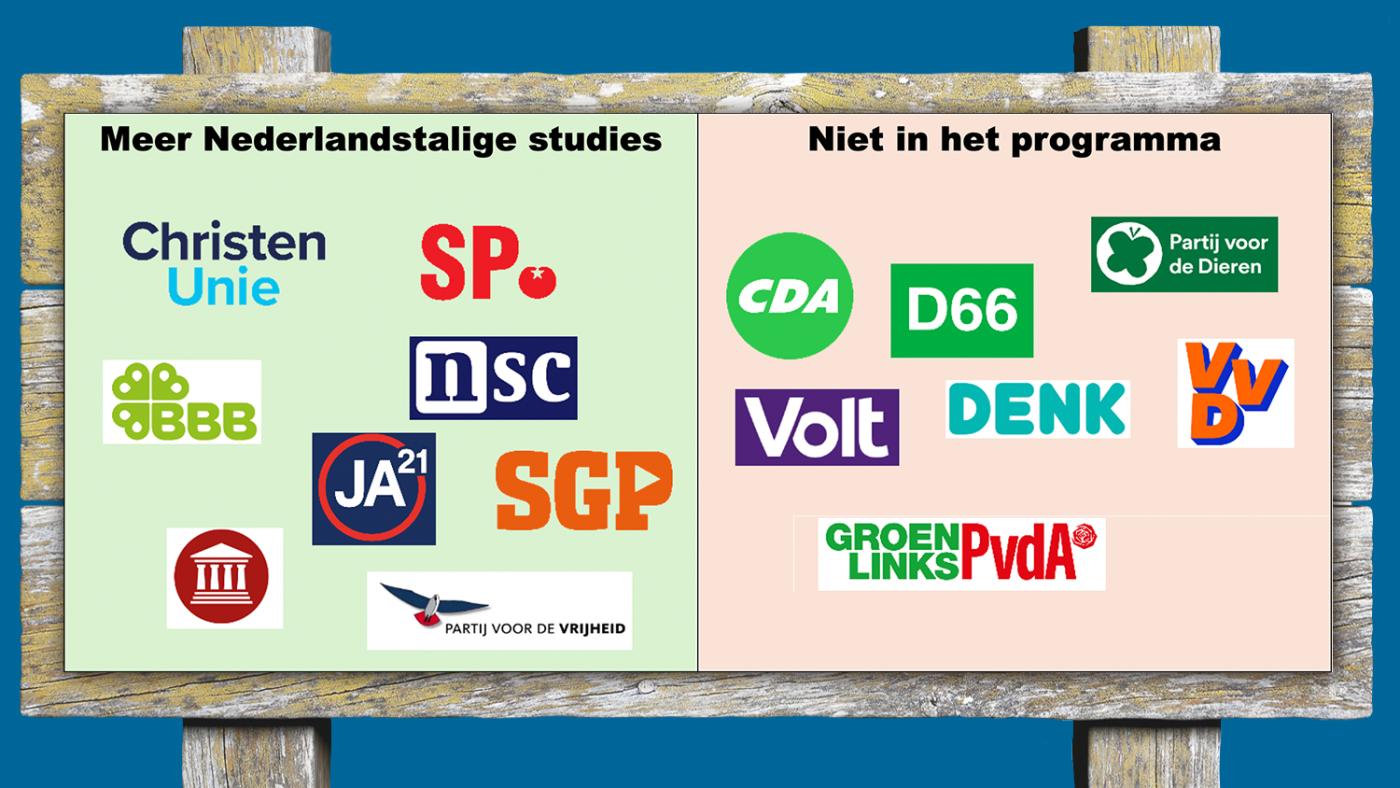
To the left, the political parties in favour of more Dutch-taught programmes in higher education. To the right, the parties whose election manifestos do not state anything in this regard.
To reverse or not to reverse the budget cuts?
When the current cabinet announced its plans to cut over two billion euros from the education budget, the sector was in shock. The amount was ultimately reduced following a deal with four opposition parties, but universities and universities of applied sciences must still tighten their belts.
Some political parties would like not only to reverse the austerity measures but also to spend more on higher education and research. Other parties do not consider this necessary. PVV celebrated the budget cuts as a victory, while the other parties in the cabinet (VVD, BBB and NSC) defended them until the very end.
Although other parties do not explicitly defend the budget cuts, they also do not suggest reversing them. The Socialist Party wants to make education free for all and invest heavily in fundamental and independent research, but it does not literally say 'we will reverse the budget cuts'. The same applies to the Party for the Animals.

To the left, the parties promising to reverse the budget cuts hitting higher education and research. To the right, those who defend the cuts or don't say anything about reversing them.
BSA
At Dutch universities, first-year students who fail to obtain the required number of credits are not allowed to remain enrolled. Some students experience this as a big stick or an unnecessary source of stress, which is why some political parties propose abolishing the requirement, also known as “binding study advice (BSA).” Other parties prefer to leave it as is, so they do not mention it in their manifestos.
GroenLinks-PvdA is one of the parties whose manifestos do not comment on it. However, the party has always sought to tinker with the BSA, so it is likely that its position on the matter remains unchanged. GroenLinks-PvdA did include the BSA in its manifesto in previous elections.
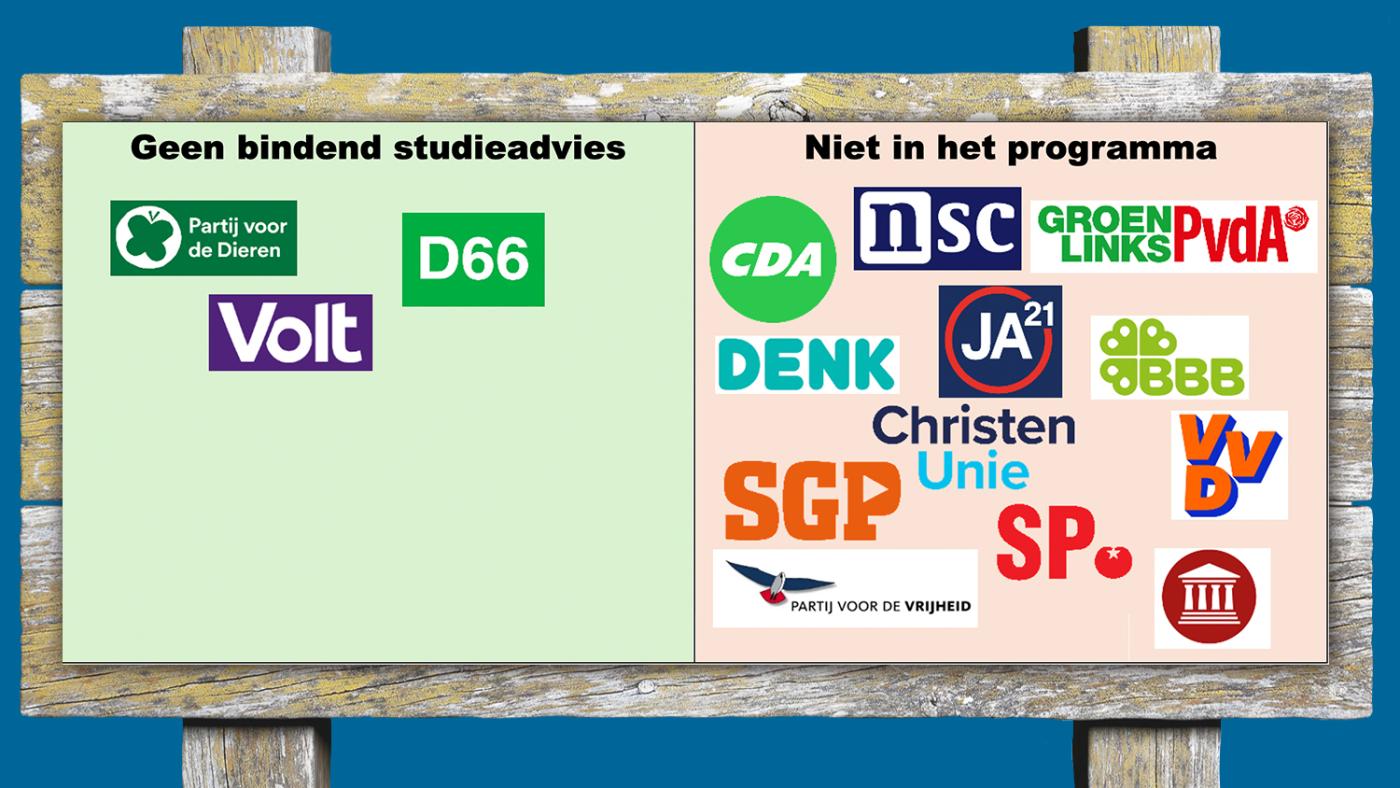
To the left, the parties that would like to abolish the BSA. To the right, the parties that did not mention the matter in their manifestos.
Funding for education programmes: fewer peaks and troughs
Should a degree programme be closed down if it attracts fewer and fewer students? This is certainly a threat in regions experiencing a population decline. Programmes such as German and French are also struggling. Can the government use funding to ensure that such programmes continue to exist?
All parties want more stable funding so that degree programmes do not have to compete for students. But what does that mean in practice? GroenLinks-PvdA would like universities and universities of applied sciences to be able to offer employees permanent contracts more quickly.
Some parties are keen to improve the connection to the labour market all at once. VVD writes: ‘In order to improve the connection to the labour market, the government will focus more on the distribution of student numbers across programmes.’ This means that the government would keep certain fields of study small and expand others. The conservative liberals of JA21 are opposed to this. However, the Party for the Animals also thinks along these lines, saying that education must be aligned with future needs.

All parties would like funding for higher education to become more stable, but those on the right only want to do so if the 'usefulness' of programmes is taken into account. The three parties below did not mention this in their manifestos.
Excuse me, may I unfurl a banner?
We are all familiar with the fierce demonstrations against universities' ties with Israeli institutions. Some parties believe that it is acceptable to cause friction, as the right to demonstrate is paramount. Others, on the other hand, believe that one should get rid of rioters and take away the Dutch passports of those with dual nationality. Mind you, this is a difference in emphasis: no one condones violence and vandalism, and no one wants to abolish the right to demonstrate.

The manifestos of the parties on the left stress the importance of the right to demonstrate, while the manifestos of the parties on the right side underscore order and the punishment of rioters. The centre-left party Denk did not mention this in their manifesto.
Democratisation of education
How much influence should students and staff have on the direction of their university or university of applied sciences? Are they properly compensated when they participate in a faculty or university council? Some parties remain somewhat lukewarm on this topic, while others discuss it with enthusiasm. NSC also highlights the crucial role of independent press outlets such as DUB in higher education.
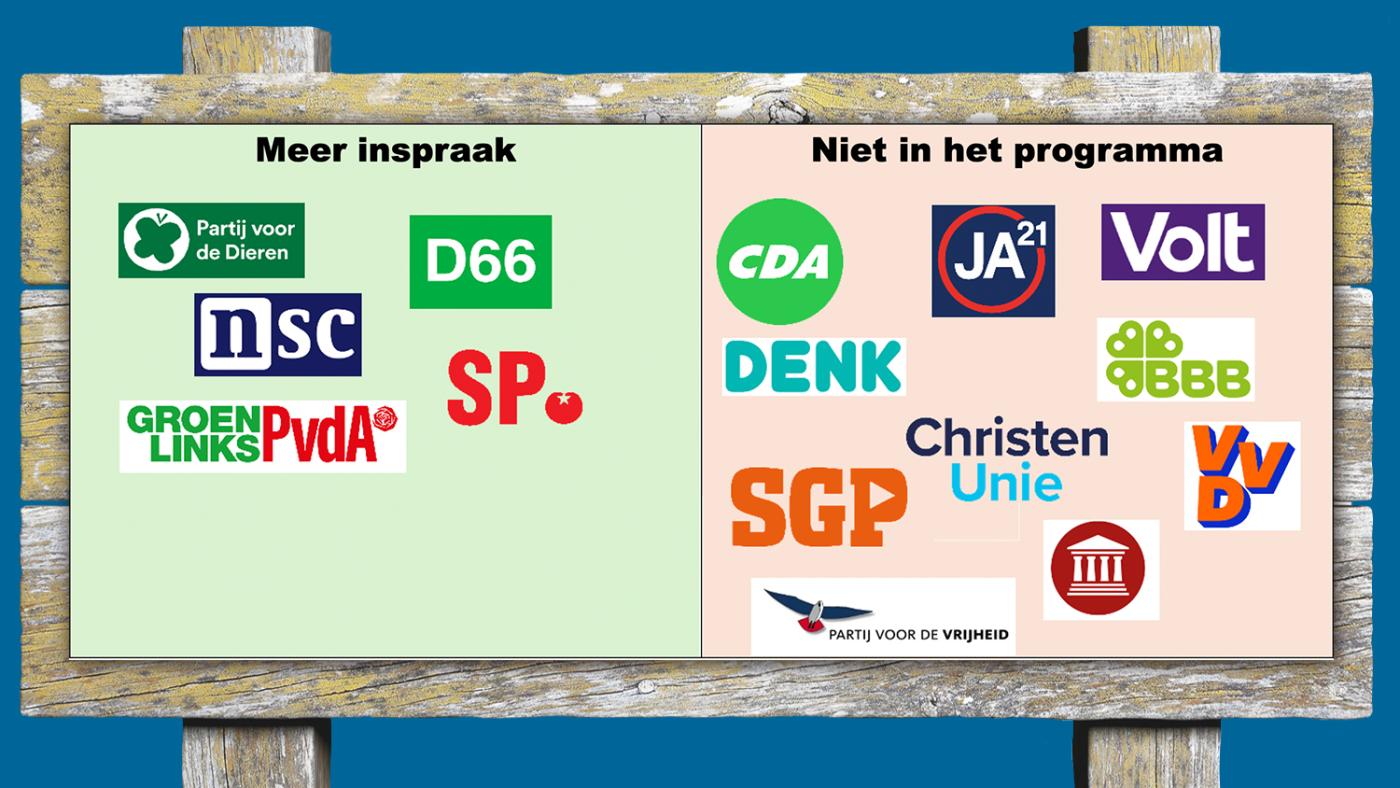
The parties on the left advocate for students and staff to have a greater say in the policies adopted by their university. The election manifestos of the parties on the left do not say anything about that.
Academic freedom
A full-blown attack on academic freedom has begun in the United States, so one would expect Dutch political parties to mention this in their election manifestos. However, not all of them do.
None of the parties is explicitly saying that they will restrict the freedom of researchers in the country. Instead, some prefer to say they would like to emphasise practice-oriented research in collaboration with the business community. In other words, they would like the government to influence the direction of research.
CDA wants to invest primarily in research into “the key technologies of the future”, including AI, green chemistry and battery technology. BBB is also moving in that direction. “BBB is firmly committed to academic freedom, but also recognises that science is becoming increasingly detached from practice.”
In some cases, it is hard to say whether the parties desire more academic freedom or not. SGP, for example, emphasises that research into the Holocaust must be able to proceed unhindered, but remains opposed to embryo cultivation for scientific purposes. The Reformed parties also want universities to conduct more "practice-oriented" research. All in all, it sounds more like “more guidance” than “more freedom”.
The far-right party Forum for Democracy is difficult to categorise. The party wants universities to be places for “free debate and sharp ideas”, but this goes hand in hand with a ban on diversity officers and safe spaces.
On the other hand, some parties openly declare their support for academic freedom, without reservation. GroenLinks-PvdA even wants to protect this freedom by law.
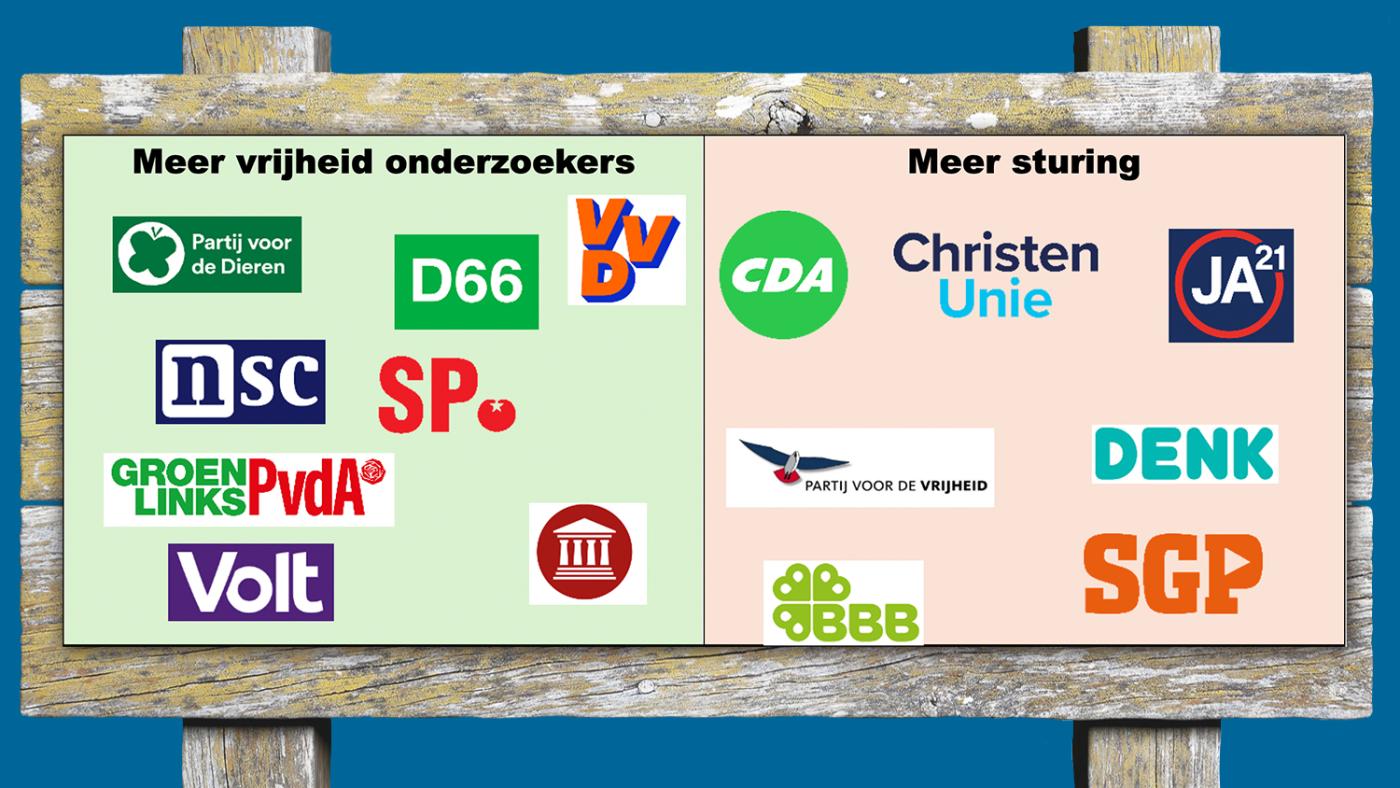
To the left, the parties that want researchers to have more freedom to research whatever they want to research. To the right are the parties that want the government to encourage or determine what researchers should focus on.
Internships are work
In some cases, expecting students to have a part-time job alongside an internship is too much to ask. Some parties believe that all interns should receive remuneration; otherwise, it is difficult for students without wealthy parents to pursue internships freely.
Others fear that such an obligation would lead to fewer internship vacancies being offered, particularly by small businesses. The Christian Union and SGP are in favour of remuneration, but only for students in secondary vocational education.

To the left, the parties that consider internships as work and, therefore, an activity that should be remunerated regardless of the programme or institution the student is enrolled in. On the right side, the parties that do not think remuneration should be extended to all interns.
Rent subsidy for rooms
It is difficult for students to find accommodation in the Netherlands. A frequently mentioned solution is to offer a rent subsidy for rooms that are not self-contained. This would allow rents for shared accommodation to rise, enabling investors to earn a higher return. Currently, investors prefer to build studios because they are eligible for rent subsidies. It sounds logical, but it is expensive for the government.
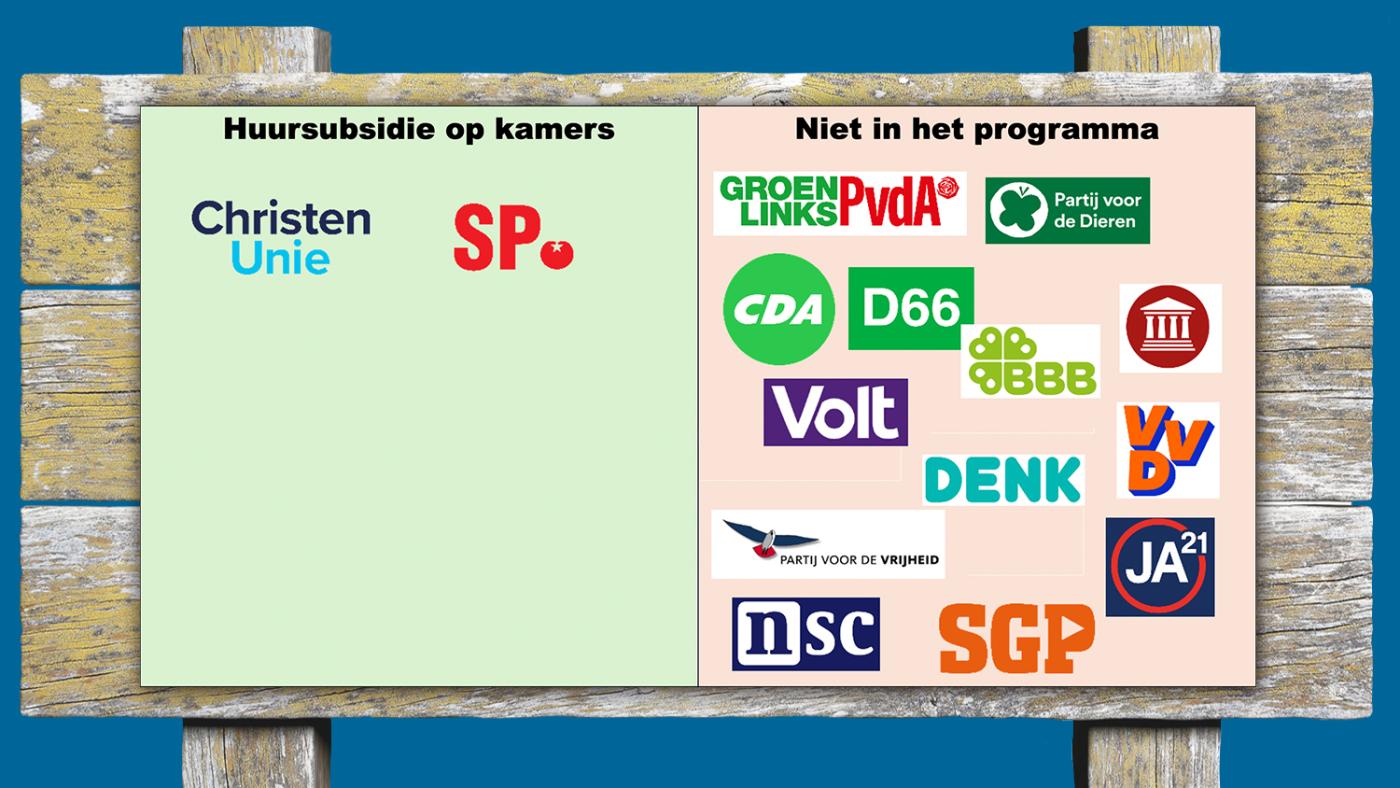
Only two parties propose a rent subsidy for shared accommodation. The parties on the right do not mention it in their manifestos.
Building lots of student housing
One way to address the dire housing shortage in the Netherlands would be to build new homes, but where exactly should these buildings be located? And how should one deal with nitrogen? All parties are in favour of building more homes, as illustrated below. Some explicitly mention student housing, while others mention young people and first-time buyers. The Party for the Animals places more emphasis on sustainability than parties like BBB and CDA, but such differences are to be expected.
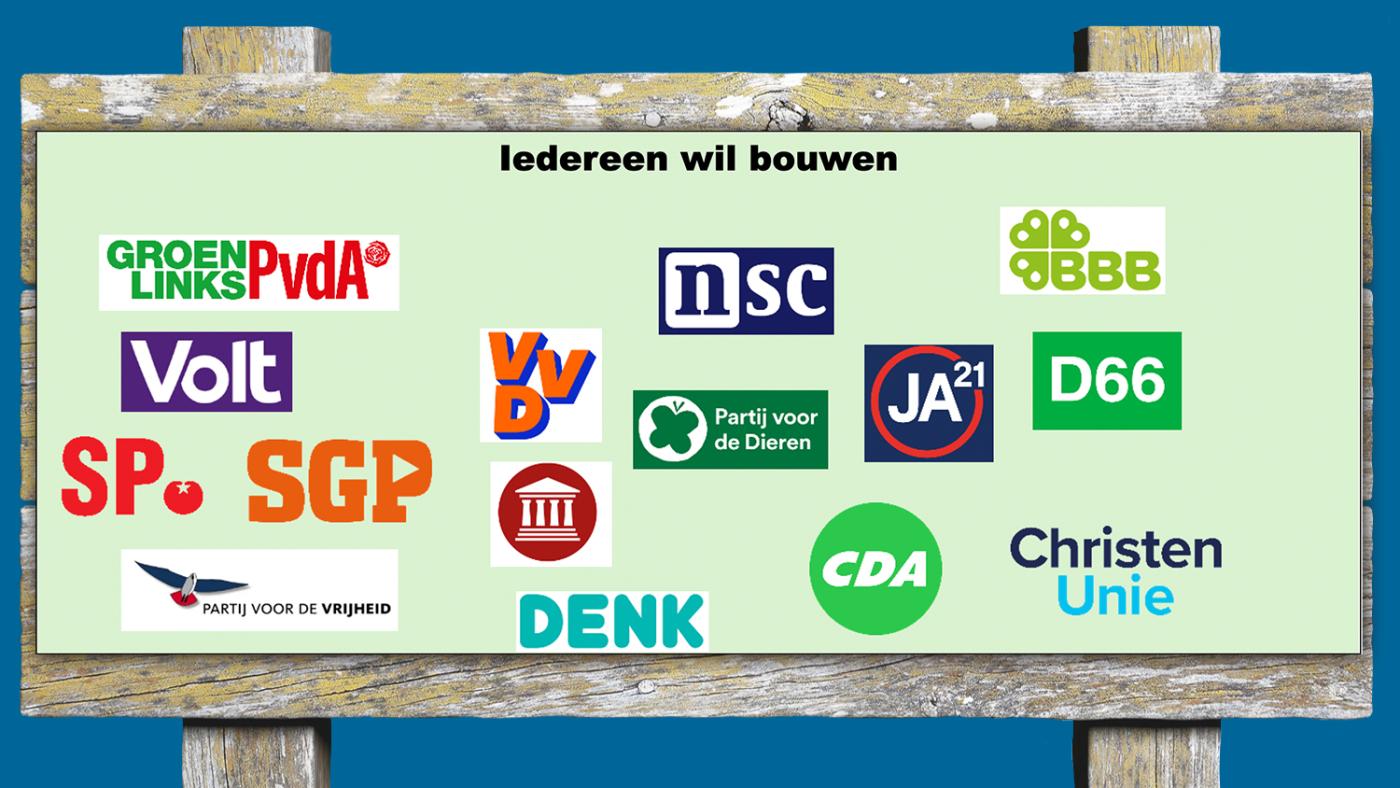
Omerkelijk dat JA21 wordt geschetst als een partij die de academische vrijheid wil inperken. De lijsttrekker heeft in januari nog juist een motie ingediend om academische vrijheid te versterken:
https://www.tweedekamer.nl/kamerstukken/moties/detail?id=2025Z01167&did…
Merk trouwens de resultaten van de stemming op:
Voor deze motie tot het bewaken van de academische vrijheid:
PVV, GroenLinks-PvdA, VVD, D66, BBB, CU, FvD, SGP, JA21.
Tegen: NSC, CDA, SP, DENK, PvdD, Volt.